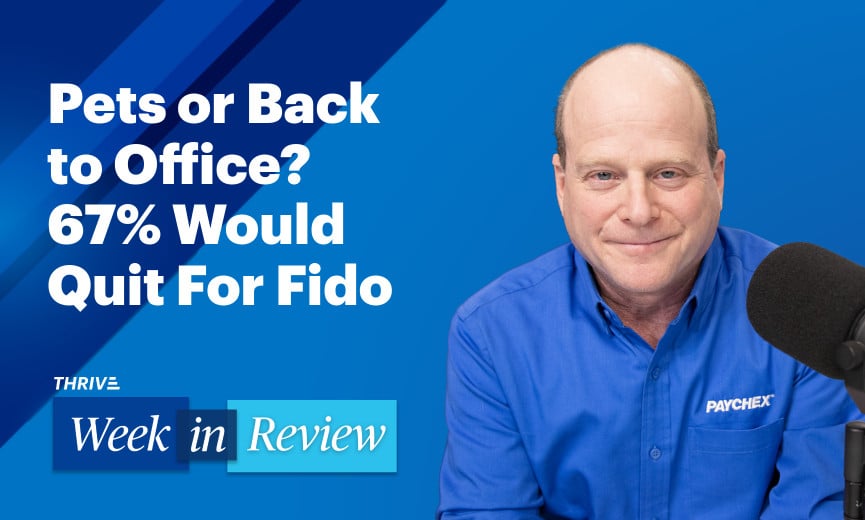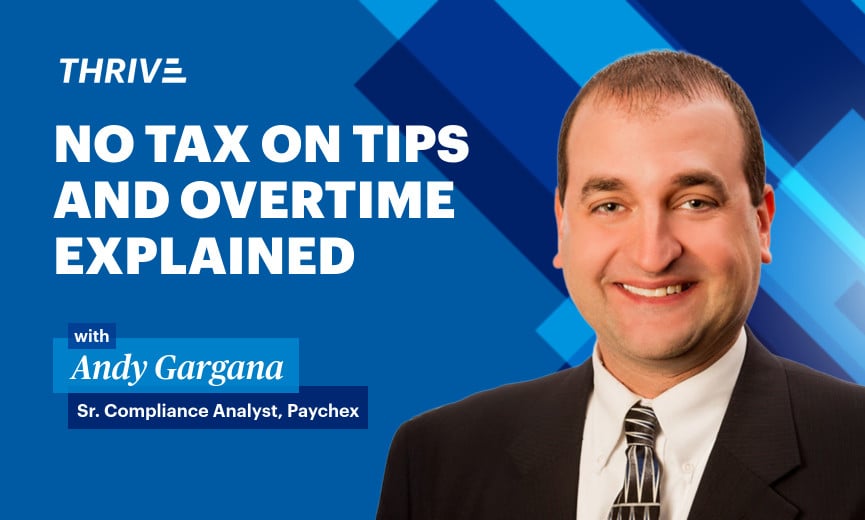- Thrive
-
Season
4Episode170
Education Missing on Job Postings, Taxing Unrealized Gains, and the Best and Worst Business States
Podcast •
Watch
Summary
Experience and education don’t seem to be the most important factors businesses are looking at when filling jobs, at least not according to the continued drop in mentions on U.S. postings to the Indeed platform. Gene Marks has some thoughts as to why and identifies the industries this is happening in. He’ll also discuss the ability of the IRS to expand its taxing power on small businesses and why Wyoming rates better than California for starting a business. Watch or listen to the episode.
View Transcript
[Gene Marks, host]
Hey everybody, it's Gene Marks, and welcome to another episode of the weekly Paychex THRIVE Week in Review podcast. This is the podcast where I take a few items of news that are of interest to you and me as business people and owners, and how these news items affect us and our businesses.
Now, before we get started, just a couple of things. On July 1 of this year, there's going to be a new Department of Labor rule going into effect regarding overtime pay, which could very well affect your business. Paychex has a ton of resources about this: written materials, as well as some webinars and videos. Go to go.paychex.com/ot-rule. That will give you all the information you need to make sure that you are prepared for this change in the overtime rules.
And, by the way, there is potential litigation which might delay the implementation of this overtime rule. I'm going to find out more about that this week, and we'll provide you with an update later this week or next week on that litigation and how it will impact your business. So, stay tuned.
Finally, before we get started, if you want to keep up on all the things that impact your business, get some advice and tips as well and back episodes of this podcast. Go and sign up for our newsletter. Go to visit paychex.com/thrive. I promise you, you will not be disappointed.
Okay, time to go to the news for this week. I have three articles that I would like to share with you. The first was on the shrm.org. This is the human resource management site, are reporting on experience and education requirements in job postings have declined. So, let me read this out to you.
“Global jobs board Indeed – I'm sure you're familiar with those guys. They reported that about 30% of U.S. job openings in April of 2024 included a years of experience requirement, which was down from 40% in April 2022.” So, over two-year period, “educational requirements are also on the decline, suggesting that more employers may be turning to skills-based hiring approach instead of traditional criteria.
“Over the last year, the share of U.S. job postings that did not include any mention of years of experience, or that explicitly stated that no experience is okay, rose from 60% to 70%, according to Indeed. The data also shows that requiring a specific amount of years’ experience is most common in job postings for roles such as project management, accounting, and engineering. Sectors that have less defined job experience include retail, hospital quality, and customer service.”
So, what's the trend that we're seeing? More and more employers are looking for people, not necessarily with job experience, which is really weird, as well as educational requirements, because it seems like, you know, employers will make up for that, by training them on the job.
It doesn't bode well for colleges and tech schools. Obviously, that depends on the industry that you're in. But, you know, I always say, if you find a good employee, somebody with the right kind of attitude, somebody that shows up to work on time, somebody that's like hardworking and dedicated to your business. You could pretty much teach them anything they need to know in your company, right? It's not rocket science.
So, I think that's a reason why we're seeing, this demand for more experienced workers or ones with educational requirements decline a little bit, and more in favor of people hiring people to teach them skills if they already don't have those skills in place. So, an interesting statistic from Indeed.
Number two story comes from the National Federation of Independent Businesses, and this is a widely reported Supreme Court case that certainly in the past week – it was a case called Moore v. the United States. Although the intricacies of that case aren't really that much concern to us as business owners, there was one thing that really caught the attention of a lot of business groups, and it's this: The court upheld a prior court's decision that broaden the scope of income to include unrealized appreciation of property, which, according to the NFIB, says will result in an increased tax on small businesses.
So, what does this mean? Well, I'm sure you're aware that for years there was some legislators that have been pushing for taxes on the wealthy, particularly on their appreciated assets that haven't been realized, which means that they own assets anywhere from houses and cars, real estate, paintings, other artwork that have appreciated in value, but they haven't been taxed because they haven't been sold.
Well, there's been a push to tax those appreciated, you know, unrealized gains and there's been push back to doing that. One of the big arguments is that it's not constitutional because the Constitution says that an income tax can be levied from, by Congress. However, this Supreme Court decision opens up the door a little bit to taxing those unrealized gains.
Now, right now, big legislatures are going after the very rich people with more than, say, $50 million or $100 million in assets. But the NFIB is worried, that once the government starts taxing unrealized gains, where does that stop and will ultimately affect smaller businesses, as well?
So, the taxation of unrealized gains could be beginning thanks to this Supreme Court decision. We want to keep an eye out on that.
Finally, there was a report that came out from gobankingrates.com listing some of the best and worst places to start and operate a business in the United States. Now, they took a lot of different factors into consideration, like tax rates and, the education and skills of the local employments. And, they combine data from both Simplify LLC and Wallet Hub. So, what do they find?
Well, Texas stands out as the top state for entrepreneurs in 2024, with no corporate income taxes and a business growth rate of 23.7% last year. Texas is also benefiting from a significant influx of educated workers, with net migration of nearly 76,000 college-educated adults.
Who's next? Florida and Wyoming. They follow closely. Florida boasts strong job creation and an influx of educated workers, while Wyoming, also without corporate income taxes, saw the highest business growth rate in the country at 39.2%. However, it is warned that potential entrepreneurs need to be wary of Wyoming's high inflation rate and low consumer spending growth.
Now, I gave you three the best Texas, Florida, and Wyoming. What did this study find as the worst? Well, Louisiana was the worst state for entrepreneurs in the country with stagnant business growth and low consumer spending growth. The state also saw a net outflow of educated workers, which can stymie business innovation and growth. Kind of a bummer because I love New Orleans.
Other states that fared poorly; Washington, D.C., California, Mississippi, and New Hampshire. They round out the bottom five. They suffered from various issues such as high corporate taxes, low business growth, and significant outflows of educated workers.
So, there are some of the best states and the worst states to consider when either operating or starting a business.
Well, thanks for watching and listening, as well. Don't forget, on July 1, new overtime rules come into place. And again, I might have more news for you on that in, in the coming days, if a court decision delays these rules. But we still need to be aware of them, and if they do come into effect, you want to know how it's going to impact your business. So, go to Paychex website. Let me give it to you again. It's go.paychex.com/ot-rule. That is the site to go to if you want to get all information written documentation as well as videos and webinars on how to prepare for the overtime rule and how it will impact your business.
And by the way, go to paychex.com/thrive and sign up for our THRIVE newsletter. You'll get a lot of good advice and tips to help you run your business.
Hey, my name is Gene Marks. Thank you so much for watching and listening. I will be back next week with some more news that impacts your business. Look forward to seeing you there. Take care.
This podcast is property of Paychex, Incorporated, 2024. All rights reserved.

 Apple Podcast
Apple Podcast Spotify
Spotify iHeartRadio
iHeartRadio









